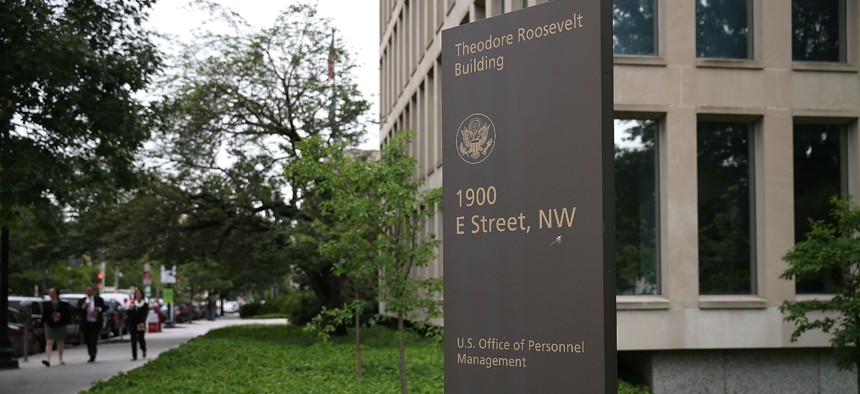
OPM will propose to delegate its authority to waive recruitment and relocation incentive payments under new regulations. Mark Wilson / Getty Images
OPM proposes making it easier to approve some recruitment and relocation incentives
Under proposed regulations, the federal government’s HR agency would no longer need to approve waivers of traditional incentive payment caps in advance, potentially speeding up the hiring and relocation processes.
The Office of Personnel Management this week proposed new regulations delegating its authority to waive the caps on recruitment and relocation incentive payments to federal employees and job candidates to the agencies themselves, a move the federal government’s HR agency says will ease administrative burdens and accelerate the hiring process.
Currently, federal agencies may provide federal workers and new hires in difficult to fill jobs recruitment and relocation incentives of up to 25% of their annual basic pay in exchange for the employee or job candidate agreeing to work at the agency for a minimum service period of up to four years. That means a current or prospective federal employee could earn a maximum of one year’s worth of basic pay via the incentives.
Agencies also may request a waiver from OPM to those caps. In situations in which there is a “critical agency need,” agencies may double the rate at which they can pay recruitment and relocation incentives to 50% of their annual basic pay per year, although the maximum total amount of an incentive payment remains 100% of their annual basic pay.
In a proposed rule published Wednesday in the Federal Register, the Biden administration proposed shifting the approval of recruitment and relocation incentive cap waivers from OPM to each individual agency. OPM’s role in the process would shift to post-approval oversight of agencies’ decision-making.
Under the new process, each agency would be required to designate an official who would be tasked with reviewing and adjudicating waiver requests. Additionally, the new regulations would eliminate the minimum service period required to receive an incentive payment. Currently set at six months, OPM argued that removal of the minimum time period would allow short-term, yet still difficult to fill positions such as paid internships to become eligible for recruitment and relocation incentives.
Retention incentive payments would not change under the regulatory proposal, as OPM reported that such changes would require the passage of legislation by Congress.
The reason for the planned change is twofold: First, to make it easier and faster for agencies to hire people in difficult to fill positions; and second, to offload some of OPM’s more transactional work and allow the agency to focus more on governmentwide HR policy.
Since the 2004 Federal Workforce Flexibility Act, which established the current recruitment, retention and relocation incentive policy, was implemented in 2005, OPM has approved 15 recruitment incentive waivers for six agencies and 11 relocation incentive waivers for four agencies.
“Permitting agencies to review and approve payment limit waivers at the agency level will reduce administrative burden on agencies and increase the efficiency of using recruitment and relocation incentives,” OPM wrote. “This will allow agencies to move more quickly in hiring new employees and relocating those who are moving into positions that are likely to be difficult to fill. Such efficiency could be especially helpful in emergency or other critical situations in which recruiting new employees or relocating current employees rapidly is necessary.”
The move is also part of OPM’s ongoing efforts to revitalize and transform itself from an agency focused on transactional compliance to a more forward-thinking role providing policy leadership on governmentwide human capital issues, as envisioned by the National Academy of Public Administration in a 2021 report. Earlier this fall, OPM Deputy Director Rob Shriver touted the importance of that report in the development of the agency’s strategic plan and is referenced often during the deliberative process.
“In its March 2021 report, NAPA recommended that OPM adopt a more decentralized and risk-based approach to executing its transactional approval and oversight responsibilities,” the proposed rule states. “Specifically, NAPA recommended that OPM delegate, to the maximum extent possible, decision-making authorities to agencies, and conduct cyclical reviews to verify that appropriate actions were taken [and] to streamline federal human capital regulations and guidance to reduce administrative burden and promote innovation while upholding merit system principles.”
OPM is seeking feedback and accepting comments on its proposal between now and Jan. 16.







